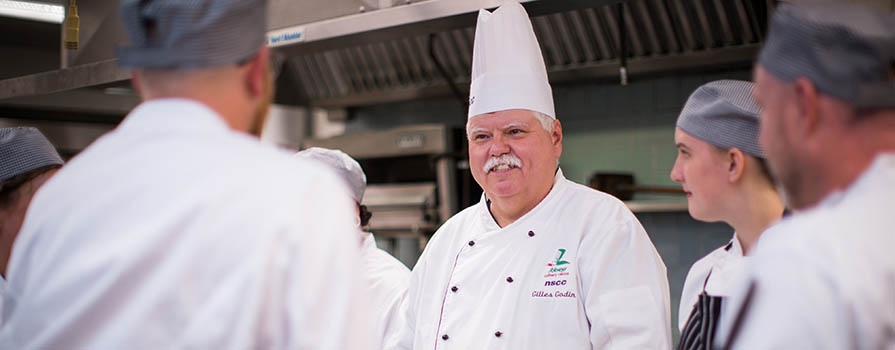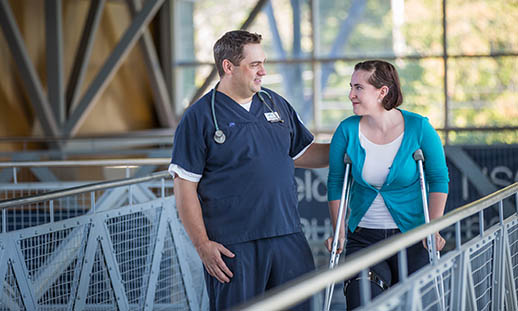Yes, Chef!

From humble beginnings learning the basics in his mother’s kitchen in Montreal to becoming a head chef at the age of 25, Chef Gilles Godin has learned the ins and outs of the ever-evolving culinary industry. Now, in his twentieth year as instructor of the Culinary Skills program at Pictou Campus, Chef Godin shares his culinary wisdom with the next generation of skilled cooks and chefs.
Why did you decide to pursue a career in culinary arts?
My mother was a wonderful cook, and I draw a lot of inspiration from her. Money was tight so she had to improvise and she could make delicious food with very little. It was something that always fascinated me, watching her work in the kitchen. I got the bug and decided to go to culinary school. I took the culinary arts program at the Institut de tourisme et d`hotellerie du Quebec, graduated in 1981 and completed my apprenticeship at the fame Queen Elizabeth hotel in downtown Montreal.
What did you do before you started teaching at the College?
After I graduated, I completed my apprenticeship at the famed Queen Elizabeth hotel in downtown Montreal. I transferred to PEI to work on the opening of the Hilton, (today, the Delta). I met my wife there, too. We decided to go out west to Saskatoon and Grand Prairie where I secured my first position as head chef at a hotel when I was only 25. We eventually returned to the Maritimes and I worked as executive chef for the Delta in Sydney. After a couple years there, I applied for the position at the Pictou Campus and now I’m in my twentieth year as an instructor.
I want to find new opportunities for students, to see what kind of experiences would be educational and exciting for them – and for me too.
Has your teaching style changed over your 20 years at the College?
You know what? Every year is different and new, and every year is fun. It’s been 20 years but it feels like my first. I still enjoy it and I still love it. When I first began teaching, I had been working as an executive chef and had a lot of experience in the industry. The industry is tough. If you don’t work hard, you’re fired. At first, I was treating my students like employees and not like students, but then I took CCEDP and that helped me understand how to be a good teacher and I’ve learned how to balance industry standards with classroom learning. Students excel when they’re hands-on in the kitchen and that’s why after two weeks of theory, the rest of the time is spent in the kitchen. I’ve learned to be more patient and more understanding of their needs and I also understand that the students are paying good money to be here. They all have the same chance to succeed.
What is the most important thing aspiring chefs need to learn?
You have to take pride in what you do, and never say ‘no’. Students who are organized, the first to show up and the last to leave, and are ready to put in their time and work hard will do well in their careers. Chefs want to train people with good basic skills and a willingness to learn so that one day, that trainee could eventually take over their job. School is the foundation, and the workforce is where they build those skills. With sharp knives, and good basic skills they can go anywhere.
What has been your greatest success so far?
We held a banquet in the Pictou Campus gym to celebrate Sobeys’ 100th anniversary. My first-year students, who had only been at school for two months, prepared a three-course meal for 600 guests. I will always remember that. More recently, we became the sole pickle and jam provider for a local shop. It’s a big achievement that when customers go into the shop, they see our NSCC products on the shelves.
Why is it important to support local producers and the community?
Without our producers, we would have nothing. We use all local produce for our pickles, and it’s important for students to go to the producers and pick the best they have available. In our kitchen, we try to use local as much as we can while things are in season. Working together with the community helps promote our students and the program. There’s a demand for cooks in this province and it’s great to promote all that our students can do.
What are your thoughts on current culinary trends?
I like to stay on top of culinary trends by reading magazines, reading articles on the internet and social media. It’s amazing what you can find. I love anything to do with Asian and Mediterranean food, pasta, pizza, but my favourite trend is healthy cooking. It’s a trend that needs to stay. You can make beautiful food and it can be good for you.
How do you ‘keep your knives sharp’?
I like to keep busy and when I’m not in the classroom I teach a cooking class at the local Sobeys. I’m also chocolatier and an ice-carver. I’m getting a little closer to retirement, but I’m not quite there yet. I want to find opportunities and experiences for the students that would be new and exciting for them and for me too.
Anything to add?
This is the best job I’ve ever had in my whole career. In a way, I wish I were ten years younger so I could have ten more years to work for NSCC. Pictou Campus has been so supportive of the program, and supportive of me.
Fast Fact
Chef Godin completed his apprenticeship at the Queen Elizabeth hotel in downtown Montreal and was a head chef by the age of 24.
Related Stories
 Share your passion
Share your passion
NSCC instructor Erin Moore helps her students grow and change as journalists and as people.
 It's never too late
It's never too late
After two decades working out West, Shawn Goulding is fulfilling his dream as a practical nurse.

